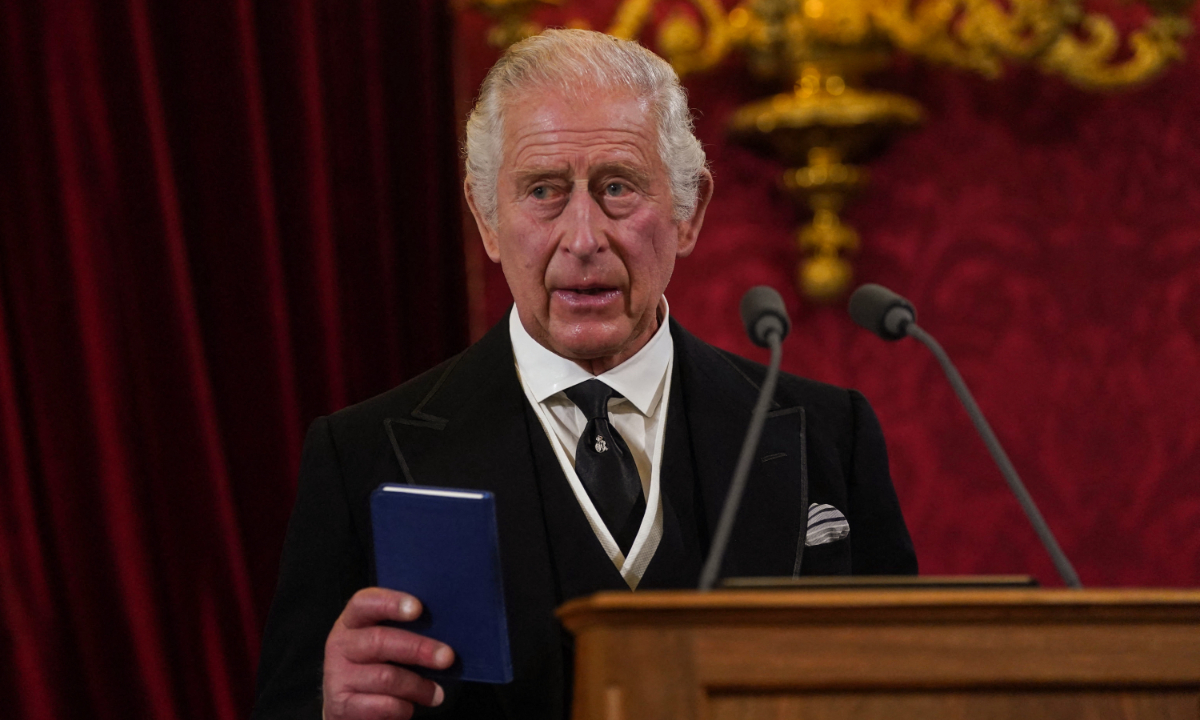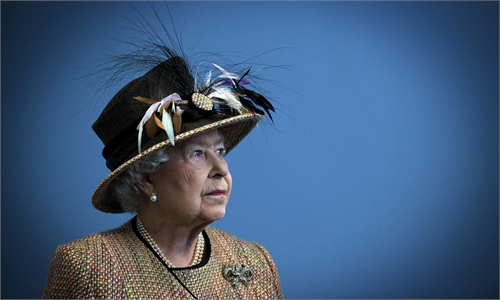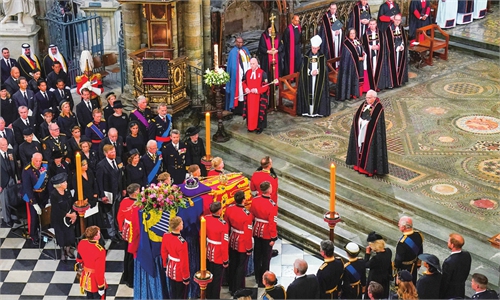Charles III formally proclaimed Britain’s King, faces mounting challenges amid uncertain future of monarchy

Britain's King Charles III makes his declaration during a meeting of the Accession Council inside St James's Palace in London on September 10, 2022, to proclaim him as the new King. Photo: AFP
With the sorrowful demise of Queen Elizabeth II, the longest-reigning monarch in British history,her son, the 73-year-old Charles Philip Arthur George, has ascended to the British throne as he was formally proclaimed King at a historic Accession Council in an ancient ceremony at St James's Palace in London on Saturday.
While pledging he would strive to uphold the constitutional government, Charles was proclaimed as the new monarch at a time when Britain is facing multiple challenges including a new government led by Prime Minister Liz Truss which is left with a huge mess to tackle with, from an ailing economy to the cost of living crisis, and growing voices in Scotland and Northern Ireland to leave the UK as well as an uncertain prospect of the UK.
With the declining influence of the Royal family, analysts believed that anti-monarchy movements may likely gather momentum in the UK as well as in countries where the Crown is still head of state, but the key lies in whether Charles could walk out of the shadow posed under his mother's glory and find his role, different from the queen, in better coordinating with the new government.
Charles III was formally proclaimed king during an elaborate ceremony at St James's Palace, where flags that were lowered to mourn the late Queen flew full-mast for a short time. Former UK prime ministers -- including Gordon Brown, David Cameron Boris Johnson and Theresa May -- lined up as the proclamation of the new king was read out.
"I am deeply aware of this great inheritance and of the duties and heavy responsibilities of Sovereignty which have now passed to me," Charles III said. "I shall strive to follow the inspiring example I have been set in upholding constitutional government and to seek the peace, harmony and prosperity of the peoples of these Islands and of the Commonwealth Realms and Territories throughout the world."
Charles returned to London from Scotland on Friday to pledge that he would serve the British people "with loyalty, respect and love, as I have throughout my life," Reuters reported.
Recalling Elizabeth's vow to serve her people for the remainder of her life, the king declared, "I, too, now solemnly pledge myself, throughout the remaining time God grants me, to uphold the constitutional principles at the heart of our nation," BBC reported.
However, with people's indelible memory of the late Queen and greater fondness for his son William and his wife Kate, King Charles III, a more controversial figure stuck in the middle, faces multiple challenges, in particular mounting calls to abandon the constitutional monarchy.
Wearing the crown for seven decades and going through 15 prime ministers, Queen Elizabeth II, while not holding actual political powers, has long become a spiritual pillar of the Britons which enhanced the image of the monarchy in the hearts of many. And her passing would undoubtedly give a heavy blow to the already tottering system, experts said.
"To a certain extent, Elizabeth's personal image, charisma, and reputation over the years have become closely associated with the monarchy. After her exit, especially if her successor Charles may not perform as well as she did, the public may shift their dissatisfaction with him to the monarchy itself," Cui Hongjian, director of the Department of European Studies at the China Institute of International Studies, told the Global Times on Saturday.
With the accession of the less popular Charles, republicans believe that the end of the 1,000-year-old institution could be a step closer. "The queen is the monarchy for most people. After she dies the future of the institution is in serious jeopardy," Graham Smith, chief executive of campaign group Republic, was quoted as saying in a Reuters article published on Friday.
Like-minded anti-monarchists argue that the royal family is "staggeringly expensive to maintain," the Reuters report said. According to officials with the Republic, the institution costs to the nation each year is about 350 million pounds.
Adding to the challenges, Charles has long been a controversial figure from scandals while he was married to Princess Diana due to alleged political interference in environmental issues and immigration policies, media reported.
While rising to become the king of the UK, Charles also became the head of state of 15 Commonwealth realms including Canada, Australia and New Zealand. Many observers foresee that the royal succession could stir up existing republican movements in the realms.
Australian Greens Party leader Adam Bandt, a prominent republican, said while offering condolences on the queen's death that "We need Treaty with First Nations people, and we need to become a Republic," he wrote on Twitter.
In Canada, recent polls also suggest about half of Canadians believe the country should end its ties to the monarchy with the death of Elizabeth.
Whether the monarchy could be kept in UK and the Commonwealth depends on whether Charles could walk out of the shadow under his mother's glories, and how he would shape his unique role as the new king, Cui told the Global Times on Saturday.
"For Charles, it is important how he sets an image for himself. When Elizabeth was on the throne, people regarded her as a 'grandmother,' a family member, so it was easier for her to touch the softer side of the people's hearts. But Charles does not have this, and meanwhile he still carries some old debts, which could be a big obstacle in dealing with people's emotions," Cui noted.
Rationally speaking, the expert added, the constitutional monarchy is still indispensable for the UK, at times when political parties fight with each other fiercely and sometimes unscrupulously, the monarch is the stabilizer. Charles needs to let people see that the monarchy is a necessary part of British politics, and better cooperate with the new government to turn the situation around.


